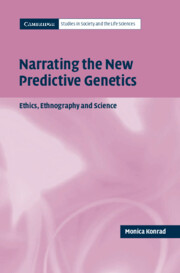Introduction
Published online by Cambridge University Press: 15 December 2009
Summary
Predictive genetic testing technology is still very much in its infancy in Western healthcare systems. However, as geneticists continue to establish links between the location of genes and particular disease aetiology, so further scientific knowledge may occasion more encompassing social definitions of who legitimately can be classified as ‘pre-ill’ or ‘pre-symptomatic’. Potentially all of us may be transformed into ‘genetic citizens’ with one kind or another of genetic ‘profile’, either before birth or sometime during our life course. But what exactly does it mean to be classified as a person with a predisposition to illness and how are the life sciences and technologies creating pre-symptomatic persons as new forms of social value?
This book is a critical exploration of the emerging pre-emptive cultures that shape the new predictive genetics. Based on original materials from fieldwork in contemporary Britain, it argues there is a pressing need for the social sciences to analyse conceptually, empirically and pragmatically how we think through the links that bind together the ideals of prophecy and health in such predictive contexts.
The ethical controversies surrounding genetic testing have largely emerged since the development of tests based on the direct analysis of a person's DNA. This has only been possible since the identification of bio-molecular markers enabled geneticists to begin the work of tracing correlations between particular disease-causing agents and specific genes.
- Type
- Chapter
- Information
- Narrating the New Predictive GeneticsEthics, Ethnography and Science, pp. 1 - 6Publisher: Cambridge University PressPrint publication year: 2005

